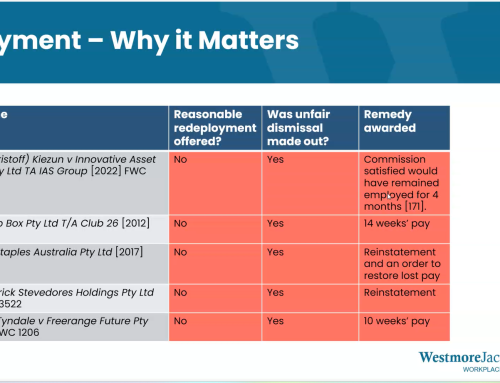
Well intended employment policies can leave employers legally unstuck. Here are the top mistakes I see employers make with their policies.
1. Trying to help line managers
Many employment policies provide line managers with guidance about what they should or should not do when faced with a particular situation. The classic example here is a disciplinary policy which describes the best practice process a line manager should follow before making a decision whether to dismiss an employee.
There are two problems with this approach.
First, line managers often don’t follow the policy anyway.
Second, an employer’s failure to follow its own policy is not only embarrassing, but it can also result in an otherwise ‘fair’ dismissal being unfair under the Fair Work Act 2009 (Cth).
If an employer wishes to educate its line managers about best practice disciplinary processes, then there are other ways to achieve this.
2. Making policies too complex
Simple policies are more likely to be followed.
Whilst some complexity may be necessary for certain policies (for example, anti-discrimination policies), employers should aim to make employment policies as simple as possible.
The best policies I have seen are those which clearly tell employees what they must and must not do.
3. Incorporating policies into employment contracts
The issue of potential incorporation of policies into an employee’s contract of employment is legally important. If an employer breaches its own policy where:
- the policy is incorporated into the employee’s contract of employment; and
- the employee has suffered loss and damage,
then the employer can expect to be liable to the employee for such loss and damage for breaching the contract.
The cases show employers need to be very careful of:
- The language used in employment contracts when referring to policies. For example, the requirement employees will “abide” with policies has been held by a Court to incorporate policies into an employment contract; and
- The language used in policies. If the language used is promissory then there is a greater risk of the policy being incorporated into an employee’s contract. Alternatively, a policy which uses merely aspirational language is less likely to be incorporated into an employment contract.
Employers should also consider including clauses in their policies and employment contracts which deal with this important issue of incorporation.
Adam Colquhoun
Principal, WestmoreJacobs® Workplace Law
This article is general information only. If you need legal advice, then please contact us.
Liability limited by a scheme approved under Professional Standards Legislation.






Thanks, great article.